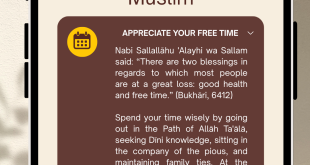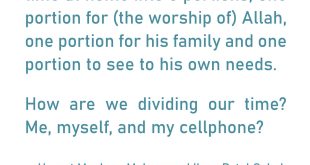
Loss of Hayaa ~ The Main Cause For The Pandemic
Allah Ta‘ala has created the peel of a fruit as a means of adornment and protection for the fruit. Once the peel is removed, the fruit loses its beauty and protection, and in no time, it begins to rot and loses all its good.
In the very same way, Allah Ta‘ala has created clothing for man as a means of beauty as well as protection from the cold and heat of the environment. Once the clothing is removed, he loses his beauty and becomes exposed to the cold and heat of the environment.
Just as Allah Ta‘ala has created physical clothing for man, as a means of beauty and protection for his body, Allah Ta‘ala has created spiritual clothing for man as a means of beauty and protection for his spiritual soul. This spiritual clothing is the clothing of hayaa.
In the Qur’aan Majeed, Allah Ta‘ala says: “And He (Allah Ta‘ala) has made for you garments which protect you from the heat (and cold, etc.).” (Surah Nahl v. 81) In another verse, Allah Ta‘ala says: “O children of Aadam (‘alaihis salaam)! We have sent down to you clothing to cover your nudity as well as to be an adornment for you, and the (spiritual) clothing of taqwa (piety and hayaa) is the best.” (Surah A’raaf v. 26)
In regard to hayaa, Rasulullah (sallallahu ‘alaihi wasallam) said, “Hayaa is an integral branch of imaan.” (Saheeh Bukhaari #9) In another Hadith, Rasulullah (sallallahu ‘alaihi wasallam) said, “Every religion has a distinguishing characteristic, and the distinguishing characteristic of Islam is hayaa.” (Sunan Ibnu Maajah #4181)
When the topic of hayaa is discussed, it is generally hayaa in dressing that comes to mind. However, although hayaa in dressing is essential and extremely important, hayaa is not restricted to dressing and attire. Rather, hayaa refers to conducting with shame, modesty and respect in all branches of a person’s life, whether fulfilling the rights of Allah Ta‘ala or the creation.
When one studies the mubaarak life of Rasulullah (sallallahu ‘alaihi wasallam), one realizes that Rasulullah (sallallahu ‘alaihi wasallam) was an embodiment of hayaa. From his ibaadah to his eating, sleeping, interacting and even attending the call of nature, every action portrayed the highest levels of shame and modesty. In every dimension of his mubaarak life, he ensured that the desired degree of hayaa was never compromised. He always showed special importance to inculcating hayaa in the Sahaabah (radhiyallahu ‘anhum), in their dressing and attire and other facets of life, and ensured that they remained completely distinct from the kuffaar.
The reason for Rasulullah (sallallahu ‘alaihi wasallam) attaching such importance to hayaa is that it serves as a shield to protect one’s imaan as well as preserve one’s Islamic morals and values. When one possesses the quality of hayaa within his life, this hayaa will guide him to conduct, in every situation, with shame, modesty and respect, fulfilling the rights of Allah Ta‘ala and the creation.
When the spiritual clothing of hayaa is removed from one’s life, his imaan and deen is left exposed and vulnerable to the environment of sin and evil. He will not deal with people with respect and be concerned about fulfilling their rights. Rather, he will only be concerned about his personal or worldly benefit. He will go to wrong places, associate with wrong company, listen to music, and view haraam on the internet, cell phone, etc. This is all on account of him not having hayaa for Allah Ta‘ala, thereby breaking the commands of Allah Ta‘ala and not fulfilling the teachings of Rasulullah (sallallahu ‘alaihi wasallam).
On one occasion, Rasulullah (sallallahu ‘alaihi wasallam) addressed the Sahaabah (radhiyallahu ‘anhum) saying, “Adopt hayaa before Allah Ta‘ala as you ought to.” Rasulullah (sallallahu ‘alaihi wasallam) then explained to them the meaning of hayaa by saying, “Hayaa is that you protect your face and all the limbs of the face, and you protect your stomach and whatever enters it. Similarly, you protect your belly from earning and consuming haraam, and you protect your heart from displeasing Allah Ta‘ala at all times. (In other words, you utilize all the faculties of your body such as the eyes, tongue, ears, hands, stomach, etc. to fulfil the commands of Allah Ta‘ala, and refrain from using them to displease Allah Ta‘ala in any way.)” (Sunan Tirmizi #2458)
In the Mubaarak Ahaadith, Rasulullah (sallallahu ‘alaihi wasallam) had foretold the coming of such crucial times before Qiyaamah where this quality of hayaa will gradually leave the lives of people. Rasulullah (sallallahu ‘alaihi wasallam) said that the learned will not be respected and followed, and people will not conduct with shame and respect before people of nobility and dignity. People will speak Arabic, yet their hearts will be like the hearts of the kuffaar. (Majma’uz Zawaa’id #861)
In this Hadith, Rasulullah (sallallahu ‘alaihi wasallam) indicated that at that time, the value system of Islam will be at a decline and there will be a degeneration in the quality of hayaa and respect in the lives of the Muslims, resulting in them following the ways of the kuffaar.
The result of hayaa leaving the lives of the ummah is that presently, Muslims have adopted the path of shamelessness and immorality which is idealized by the kuffaar. Hence, most homes have been affected by photography and the evil influences of the TV, internet, etc. Currently, with the invention of the smart phone, it is easy for one to commit sins at the mere press of a button, and hence sins are being perpetrated throughout the world on a macro-level.
Rasulullah (sallallahu ‘alaihi wasallam) foretold that when immorality and vice will be the order of the day, then await earthquakes, pandemics, epidemics, plagues, viruses and sicknesses that were never heard of and will be such that it will leave people perplexed and helpless. Rasulullah (sallallahy ‘alaihi wasallam) also mentioned that the only solution at that time will be to turn to Allah Ta‘ala and earnestly beg His forgiveness for their sins, in the manner that a drowning person cries in dua when he is drowning and on the verge of losing his life. (Sunan Ibni Maajah #4019, Hilyatul Awliyaa 3/48)
We make du‘aa that Allah Ta‘ala bless the entire ummah of Rasulullah (sallallahu ‘alaihi wasallam) to inculcate the mubaarak quality of hayaa in their lives, repent for their sins and come onto the complete sunnah of Rasulullah (sallallahu ‘alaihi wasallam) in all facets of their lives.
 Wifāq ul Ulāma (SA) ASSOCIATION OF SOUTH AFRICAN 'ULAMA
Wifāq ul Ulāma (SA) ASSOCIATION OF SOUTH AFRICAN 'ULAMA

